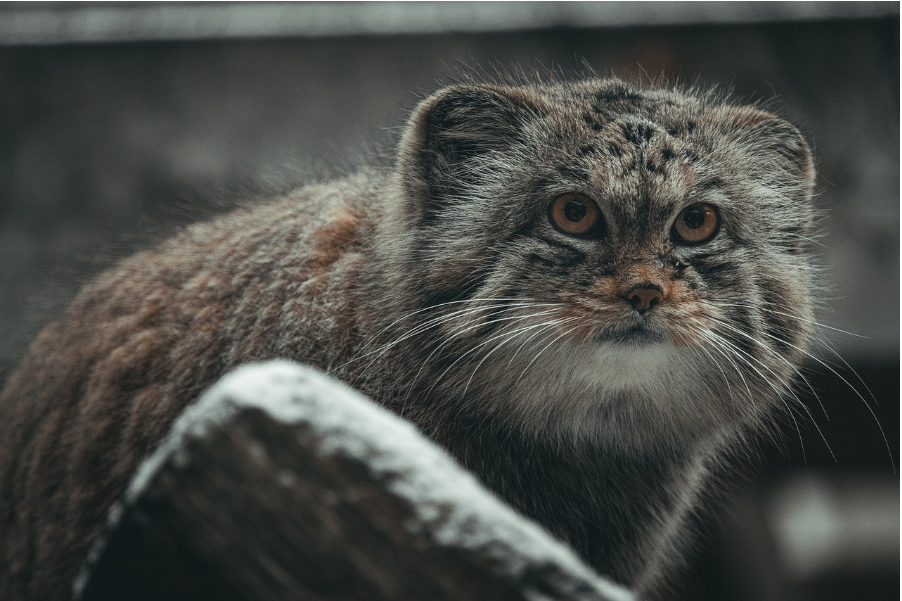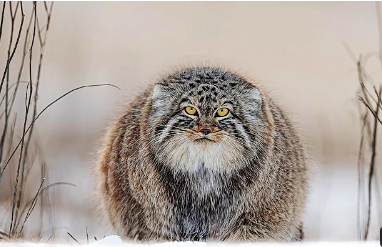Have you ever come across a captivating photo of a Pallas's cat and thought about having one as a pet? These unique and elusive small wild cats have gained popularity due to their captivating appearance and mysterious nature. However, Pallas's cats, scientifically known as Otocolobus manul, are not suitable as domestic pets for several reasons. In this article, I will outline eight solid reasons why it is not advisable to keep Pallas's cats as pets.
1. Natural habitat and adaptability
The Pallas's cat, also known as the manul, is native to the vast grasslands and high-altitude steppes of Central Asia. These areas are delicate and balanced ecosystems that have evolved over time. Introducing a Pallas cat into a different environment can disrupt this fragile balance and harm other native species.
Pallas cats are adapted to the extreme conditions of their natural habitat, including freezing temperatures and scarce resources. Replicating these conditions in a domestic setting is challenging and may not provide the cat with the necessary physical and mental stimulation it needs to thrive.
2. Unique dietary needs
Pallas cats are strict carnivores, relying mainly on small mammals for food. Their digestive systems are specialized for this diet, making it difficult to ensure their nutritional needs are met in captivity. A lack of proper nutrition can lead to severe health issues and compromise the cat's overall well-being.
Due to their specific dietary needs, providing a balanced and appropriate diet for a Pallas cat can be complicated and expensive. It often requires sourcing and preparing a variety of raw meats, which may not be practical or feasible for the average pet owner.
3. High level of aggression and territorial behavior
Pallas cats possess strong hunting instincts that drive them to roam and protect their territory. In the wild, they have vast ranges that allow them to fulfill these instincts. However, in a domestic setting, their natural behaviors can lead to aggression towards humans and other pets.
Managing aggression in captive Pallas cats requires extensive knowledge and experience. Without the proper understanding of their behavior and needs, attempting to keep them as pets can result in dangerous situations for both the cat and its owners.
4. Difficulty in socialization and bonding
Pallas's cats are solitary creatures, rarely seeking social interactions. They prefer the company of their own kind and have limited interest in forming bonds with humans. This solitary nature makes them unsuited for the typical companionship expectations of a pet.
Even with sufficient socialization efforts, Pallas's cats may never fully bond with humans. Their independent disposition and lack of domestication over centuries make it difficult to establish a strong and meaningful relationship that many pet owners desire.
5. Specialized veterinary care and health challenges
So you're thinking of getting a Pallas cat as a pet? Well, hold your horses (or should I say, hold your wild cats?) because these adorable creatures come with their fair share of health challenges. Pallas cats have unique health risks and vulnerabilities that require specialized veterinary care. From dietary requirements to potential genetic disorders, these cats need expert attention to ensure they lead happy and healthy lives.
Let's be honest, finding a vet who specializes in Pallas cats might be like finding a unicorn in a haystack. These experts are few and far between, making it difficult to find the necessary professional help when your furry friend needs it most. So, before you rush into getting a Pallas cat, make sure you've got a dedicated veterinarian who knows their way around these magnificent creatures.
6. Legal restrictions and ethical concerns
Now, I hate to burst your bubble, but owning a Pallas cat might land you in some legal hot water. These small wild cats often fall under various legal restrictions and regulations, which means you could end up facing fines or even lose your new feline friend. So, before you become a self-proclaimed Pallas's cat whisperer, do your research and make sure you're not breaking any laws.
Furthermore, while your dream of owning a Pallas cat might be tempting, it's essential to consider the ethical implications. Pallas cats are part of our precious wildlife, and keeping them as pets can contribute to their decline in the wild. By supporting wildlife conservation efforts and appreciating these animals in their natural habitats, we can help preserve their existence for future generations.
7. Lack of domestication and unsuitability for captivity
We all love our domesticated pets, don't we? But here's the thing - Pallas's cats are not your typical house cats. These wild felines have not undergone the centuries-long process of domestication that our fluffy companions have. As a result, they have different instincts, needs, and behaviors that might not align with the expectations we have for our pets. It's like trying to turn a rock into a fluffy pillow. It's just not gonna happen.
Creating a suitable environment for a Pallas's cat in captivity is no walk in the park. These cats require large spaces to roam, opportunities to exhibit their natural behaviors, and specialized diets. Meeting these requirements can be challenging, especially for the average pet owner. So, unless you're ready to build a mini Pallas's cat paradise in your backyard, it might be best to leave these magnificent creatures where they belong - in the wild.
8. Conservation efforts and importance of preserving wild populations
Pallas's cats are facing numerous threats in the wild, including habitat loss, poaching, and climate change. With their populations already declining, it's crucial to prioritize their preservation rather than keeping them as pets. By supporting conservation efforts and raising awareness about these beautiful creatures, we can contribute to their survival and ensure a future where Pallas cats roam freely in their natural habitats.
If you truly have a soft spot for Pallas's cats, there are better ways to make a difference than trying to domesticate them. Captive breeding programs play a vital role in conserving endangered species, including Pallas cats. These programs aim to increase the population of these animals in a controlled and sustainable manner, ultimately helping to preserve the species for generations to come. So, instead of being a pet owner, you could become a wildlife hero by supporting these initiatives.
Conclusion
While the idea of owning a Pallas's cat as a pet may seem appealing, we need to consider the welfare of these magnificent creatures. Their specialized dietary needs, large living space requirements, conservation concerns, legal implications, unique behavioral traits, and high maintenance demands make them unsuitable as pets. Instead, let's appreciate and admire them from a distance, ensuring their survival in the wild for future generations to admire. Let us be responsible stewards of the environment and protect these incredible beings in their natural habitat where they truly belong.






